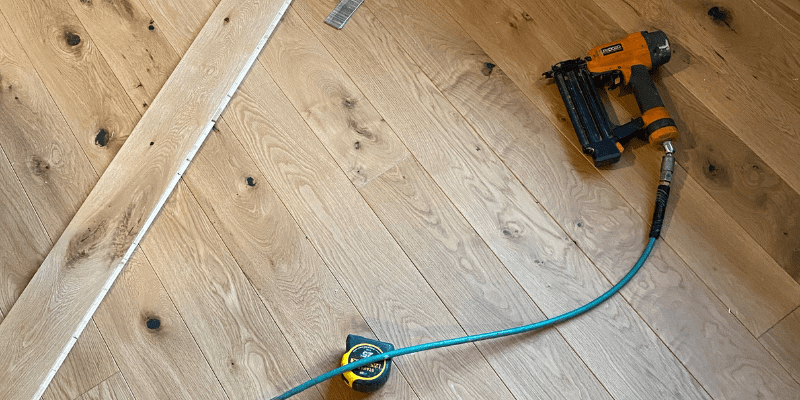Why Engineered Hardwood Stands Out
Engineered hardwood is built differently from solid hardwood. While the surface layer (called the veneer) is made of real wood, the core layers are constructed using cross-bonded plywood or high-density fiberboard. This structure provides exceptional stability, making engineered hardwood less prone to warping from Seattle’s damp climate.
But its benefits go beyond durability—engineered hardwood is considered more sustainable because it uses less solid wood. A single log can produce multiple engineered planks, meaning fewer trees are harvested for the same amount of flooring.
Key Advantages of Engineered Hardwood:
- Resource Efficiency: Uses up to 70% less solid wood than traditional hardwood flooring.
- Stability: Performs better in humid environments, reducing the risk of cupping or gapping.
- Design Flexibility: Available in wide plank and specialty finishes that would be costly with solid wood.
- Long Lifespan: High-quality engineered floors can be sanded and refinished, extending their use for decades.
Sustainability Features of Engineered Hardwood
1. Responsible Sourcing and Certifications
Many engineered hardwood brands, such as Hallmark, Mirage, and Urbanfloor, prioritize responsible sourcing. Look for flooring that is FSC-certified (Forest Stewardship Council), which ensures the wood is harvested from sustainably managed forests.
2. Eco-Friendly Adhesives and Finishes
At LUKS Construction, we prefer brands that use low-VOC or zero-VOC adhesives and finishes. This not only improves indoor air quality but also reduces environmental impact during manufacturing. Products like Bona Traffic HD (water-based finish) can be applied for refinishing engineered floors, offering a healthier alternative to traditional oil-based polyurethane.
3. Durability and Lifecycle Impact
The longer a floor lasts, the less often it needs to be replaced, cutting down on waste and resource use. High-quality engineered hardwood can last as long as 30–50 years when professionally installed and maintained.
Engineered Hardwood vs. Solid Hardwood: Which is Greener?
While solid hardwood remains a beautiful, timeless choice, engineered hardwood has an edge in terms of resource conservation. Because the veneer is thin compared to a full plank of solid wood, manufacturers can produce more flooring from a single tree. Additionally, engineered floors often use fast-growing species like birch or eucalyptus for their core, which are more renewable than slow-growing oak or maple.
Case Study: Bellevue Condo Transformation
One of our recent clients in Bellevue wanted to replace old carpet with a modern yet eco-friendly flooring option. We recommended 7-inch European oak engineered hardwood, which offered both sophistication and sustainability.
- Challenge: Limited subfloor height and the need for minimal disruption.
- Solution: Engineered hardwood’s slim profile allowed us to install directly over a concrete subfloor with a sound-reducing underlayment.
- Result: A sleek, modern space with reduced environmental impact, thanks to FSC-certified materials and water-based finishing.
Tips for Homeowners Choosing Engineered Hardwood
1. Check for VOC Ratings
Ask your flooring contractor about adhesives and finishes. Opt for GreenGuard or CARB2-certified products that ensure better indoor air quality.
2. Select a Reputable Installer
Proper installation is crucial for longevity. LUKS Construction’s team ensures precise acclimation, subfloor preparation, and dustless finishing techniques to maximize your floor’s lifespan.
3. Choose Timeless Styles
Sustainability isn’t just about materials—it’s also about design. Classic colors like natural oak or warm walnut remain in style for decades, meaning you’re less likely to replace your floors just for aesthetic reasons.
Why Seattle Homeowners Love Engineered Hardwood
Seattle’s climate, with its mix of rainy seasons and fluctuating humidity, can be tough on solid hardwood. Engineered hardwood, however, provides the perfect balance of resilience and beauty. Plus, its eco-friendly construction resonates with the city’s sustainability values.
At LUKS Construction, we’ve helped homeowners in Seattle, Bellevue, Kirkland, Redmond, and Issaquah create stunning interiors with engineered hardwood floors that are both planet-friendly and built to last.
Final Thoughts: Is Engineered Hardwood Right for You?
If you’re seeking a flooring option that’s both stylish and sustainable, engineered hardwood is a smart investment. It pairs the natural warmth of wood with a modern, eco-conscious design. Whether you want wide planks for a spacious Sammamish home or a durable option for a Redmond townhouse, LUKS Construction can guide you through the best choices for your home and lifestyle.
Ready to Upgrade Your Floors?
Transform your home with eco-friendly engineered hardwood installation from LUKS Construction. Call us at 425-971-2895 or book your free estimate online at www.luksconstruction.com.





